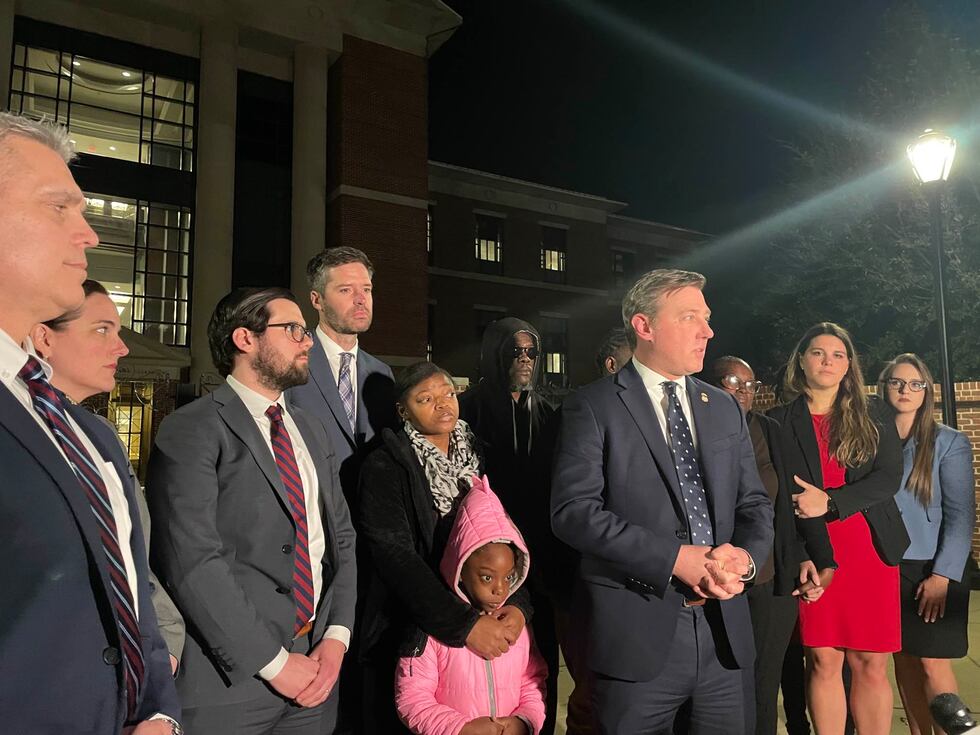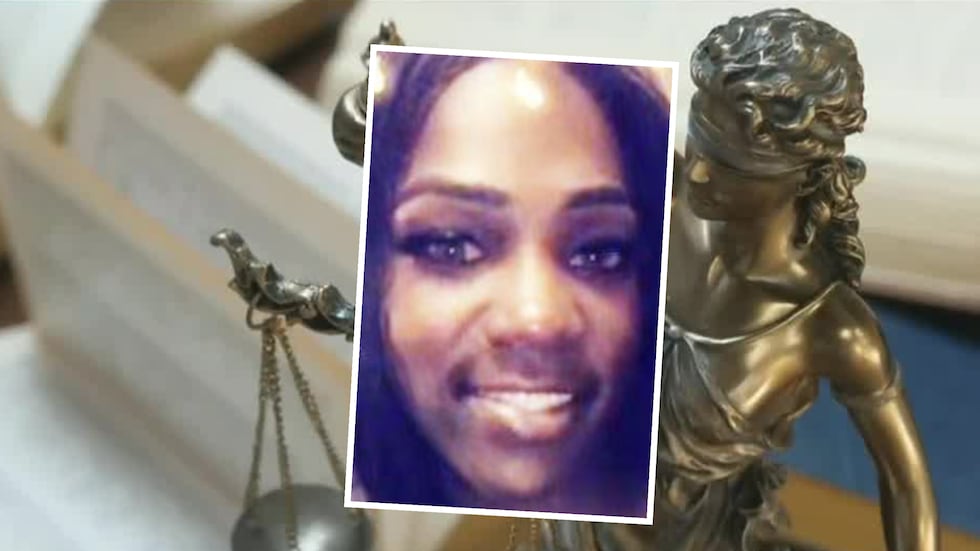Jury reaches verdict in hate-crime trial for Allendale trans murder case
COLUMBIA, S.C. (WRDW/WAGT) - The federal hate-crime trial wrapped up Friday for a man accused in the 2019 Allendale murder of a transgender woman.
The jury found Daqua Lameek Ritter guilty of one count of murder, one count of using a firearm to commit a crime, and one count of obstruction of justice.
It’s the first federal trial over a hate crime based on gender identity – a trial over the murder of Dime Doe.

The U.S. Department of Justice alleges that in August 2019, Daqua Lameek Ritter coaxed Doe into driving to a sparsely populated rural county in South Carolina and shot her to death her after word of their secret sexual relationship started getting out.
The indictment alleges the motive was Doe’s actual and perceived gender identity.
EARLIER COVERAGE:
- Hate-crime jury hears about day of Allendale trans murder
- Federal hate-crime trial begins in Allendale trans murder case
- Why does hate-crime legislation keep stalling in South Carolina?
- Allendale murder case highlights lack of S.C. hate-crime law
Before lunch on Friday, jurors heard several witnesses who were among the final ones of the 28 who have testified during the trial, which began Tuesday.
The witnesses included local residents and acquaintances of the suspect who spoke about the incidents on the day of the killing. The witnesses also included experts who discussed the evidence gathered at the scene.
Among Friday’s witnesses was James Green, an expert in firearms identification.
He looked at three cartridge cases from the car where Doe was slain. All three were fired from the same gun, he said. He also looked at the bullets recovered in the autopsy and said he was unable to know whether the bullets matched the cartridge cases.
Dr. Kelly Rose, a forensic pathologist in Newberry, walked jurors through Doe’s autopsy. The prosecution showed photos of Doe’s body with three bullet holes on her head – one above the ear, one above the cheek and another below the cheek but above the jawline. Jurors also saw a head X-ray to see where each bullet landed in Doe.
The autopsy found the cause of death was gunshots to the head.
The first shot didn’t kill her right away but she would have been dead in a matter of minutes, jurors were told.

On Thursday, jurors had heard from a witness who said Ritter said he’d told Doe to meet him to talk about a video and photo of them together. The witness, Ritter’s cousin Jamie Priester, testified that Ritter said when Doe looked down to delete the video, that’s when he shot her the first time.
Also testifying Friday was Jasmine Frazier, who saw Ritter on the day of the murder. She said he was wearing white shirt and orange shorts, and she saw him carrying bags with clothes inside, then she saw smoke in a barrel.
The defense pulled out a transcript from an interview with law enforcement after the murder in which she said she saw someone other than Ritter dumping something into the fire in the barrel.
However, another witness Friday, Artavious “Tay-Tay” Youmans, said he saw Ritter throwing something into the fire.
At issue is whether Ritter burned the clothes he was wearing when he allegedly shot Doe.
On Thursday, jurors had heard from witness Xavier Pinckney, a friend of Ritter who was also charged in the case and pleaded guilty to obstructing an investigation back in October.
On the day of the murder, he said he saw Ritter in different clothes but carrying the ones he’d worn earlier. He asked for gasoline and a lighter, saying he wanted to set the clothes on fire.
Also Friday, Youmans testified that days before the murder, he overheard Ritter saying he was “going to beat someone up” but didn’t think too much into it. After Doe’s murder, he testified that Ritter said: “Nobody is going to have to worry about him anymore.”
After hearing from the 28th and final witness, court broke for lunch Friday.
Final arguments lasted around four hours, then the jury was sent back to deliberate.
As of 8:05 p.m., “No updates. The judge has not yet said if they don’t reach a verdict tonight at what time she would have them break and if she would call them back tomorrow or Monday,” said the Department of Justice’s Public Information Officer.
At 9:22 p.m., the jury reached a guilty verdict.

Earlier in the week, jurors were told about the secret sexual relationship between Ritter and Doe.
On Thursday, jurors had heard from Pinckney, who said before the murder, Ritter was upset and said he “didn’t want people to go around” saying he was sleeping with Dime. Pinckney said Ritter then added that he was going to “fight Dime” and threatened to beat her up.
Jurors were told the matter came to a head when Ritter’s then-girlfriend, Delasia Green, discovered text messages between Ritter and Doe.
Green stated she went through Ritter’s phone, saying she had a “gut feeling” and wanted to go through his texting apps, Facebook and text messages. She stated she saw texts between Ritter and an unsaved number, later identified as Doe’s.
Green stated she questioned Ritter about Doe. She says he told her to “not question his sexuality,” saying he was upset about her confronting him about the text messages.
Priester testified that Ritter was upset about a photo of Doe and Ritter on Doe’s phone. Priester said Ritter didn’t want the photo on social media.
In cross-examination, the defense said there was also a video of Doe and Ritter in bed together.
During opening arguments, Assistant U.S. Attorney Ben Garner portrayed Ritter as someone working vigilantly to avoid the ridicule he’d face if his secret relationship was exposed.
How it all allegedly unfolded
It was no secret in Allendale that Doe had begun her social transition as a woman shortly after graduating high school, her close friends testified. Doe started dressing in skirts, getting her nails done and wearing extensions. She and her friends went out drinking. They discussed boys they were seeing.
One of those boys was Ritter, who traveled from New York to visit family during summertime. Doe and Ritter grew close over the course of those stays.
Ritter initially told Green that he and Doe were cousins, the girlfriend testified this week. But then she found messages on his phone from an unsaved number that spoke of “getting a room.” She assumed they were from Doe.
When Green confronted Ritter, he became upset and told her that she shouldn’t question his sexuality, she said.
Yanna Albany, Doe’s cousin, testified that she too had a relationship with Ritter that summer but ended it after about three weeks when Doe told her she was also seeing him. Albany said when she broke up with Ritter, he turned red, threatened to beat Doe for “lying on him” and used a homophobic slur.
Nonetheless, Doe’s relationship with Ritter seemed to grow stronger after the entanglement, Albany said. Other friends said Doe never mentioned any drama between the two.
Still, texts obtained by the FBI suggest that Ritter sought to keep their connection under wraps as much as possible. He would remind Doe to delete their communications from her phone, and the majority of the hundreds of texts sent in the month before her death were removed.
Shortly before Doe’s death, the text messages started getting tense. In a July 29, 2019, message, she complained that Ritter did not reciprocate her generosity. He replied that he thought they had an understanding that she didn’t need the “extra stuff.” He also told her that Green had recently insulted him with a homophobic slur. In a July 31 text, Doe said she felt used and that Ritter should never have let his girlfriend find out about them.
Ritter’s defense attorneys said the sampling of messages introduced by the prosecution represented only a “snapshot” of their exchanges. They pointed to a July 18 text in which Doe encouraged Ritter, and another exchange where Ritter thanked Doe for one of her many kindnesses.
But witnesses delivered other potentially damning testimony against Ritter.
On the day Doe died, a group of friends saw the defendant ride away in a silver car with tinted windows — a vehicle that Ritter’s acquaintance Kordell Jenkins testified he had seen Doe drive previously. When Ritter returned to play cards several hours later, Jenkins said he wore a new outfit and appeared “on edge.” It was a buggy summer day, and the group of four began building a fire in a barrel to smoke out the mosquitoes.
Ritter emptied his book bag into the barrel, Jenkins testified. He said he couldn’t see the contents, but assumed they were items Ritter no longer wanted, possibly the clothes he’d worn earlier that day.
Jenkins said that when the two ran into each other the following day, he could see the silver handle of a small firearm sticking out from the waistline of Ritter’s pants. He said Ritter asked him to “get it gone.”
Defense attorneys argued it was preposterous to think that Ritter would ask someone he barely knew to dispose of an alleged murder weapon.
But soon after Doe died, Allendale was abuzz with rumors that Ritter had killed her.
Green testified that when he showed up later that week at her cousin’s house in Columbia, he was dirty, smelly and couldn’t stop pacing. Her cousin’s boyfriend gave Ritter a ride to the bus stop, presumably so he could return to New York. Before he left, Green asked him if he had killed Doe.
“He dropped his head and gave me a little smirk,” Green said.
Ritter monitored the fallout from Doe’s death from New York, according to FBI Special Agent Clay Trippi, citing Facebook messages between Ritter and Pinckney. On Aug. 11, Pinckney told Ritter nobody was “really talking,” which Trippi said he took as a reference to scant cooperation with police.
But by Aug. 14, Pinckney was warning Ritter to stay away from Allendale because he’d been visited by state police. He later said that somebody was “snitching.”
Deadly trend
In recent years, there has been a surge in attacks on the LGBTQ+ community, and Doe is one of several transgender and gender-fluid murder victims in the CSRA. Others include:
- The July 2022 murder of Keshia Geter at the Knights Inn hotel on Boy Scout Road in Augusta.
- The Augusta murder of 33-year-old Felycya Harris, whose body was found Oct. 3, 2020, at Meadowbrook Park.
- The March 12, 2020, murder of John Scott Devore, also known in the community as Scottlynn Devore.
Copyright 2024 WRDW/WAGT. All rights reserved.















